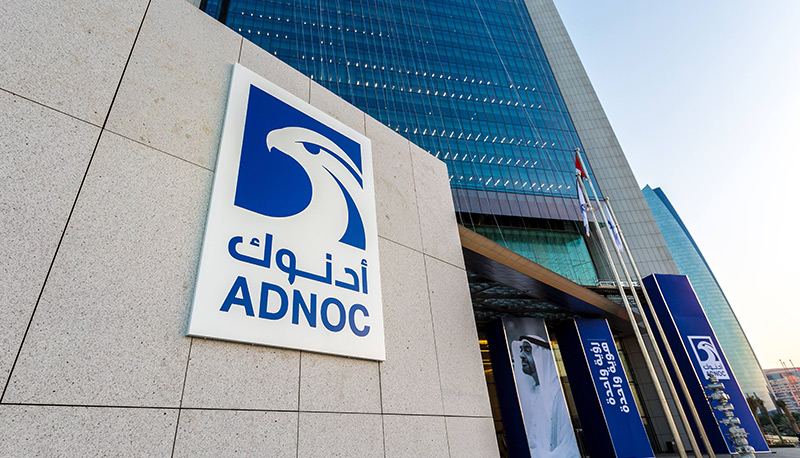Shipment, produced by Fertiglobe, delivered to Mitsui for use in clean-power generation, underscoring ADNOC’s efforts to support its customers to decarbonize
Landmark achievement builds on previous demonstration cargos delivered by ADNOC as it accelerates development of global low-carbon hydrogen and ammonia value chains
ADNOC aims to capture 5% of the global low-carbon hydrogen market by 2030 in support of the UAE’s National Hydrogen Strategy
Abu Dhabi, UAE – May 14, 2024: ADNOC has delivered the world’s first certified bulk commercial shipment of low-carbon ammonia enabled by carbon capture and storage (CCS) to Mitsui & Co., Ltd. (Mitsui) for use in clean-power generation in Japan. The low-carbon certification process, from production to delivery, has been conducted by TÜV SÜD, an internationally renowned certification agency.
The landmark shipment produced by Fertiglobe was enabled by ADNOC’s $23 billion (AED84 billion) allocation towards decarbonization, low-carbon solutions and climate technologies and underscores its efforts to support its customers to decarbonize their operations, particularly in hard-to-abate sectors. It builds on previous demonstration cargos delivered by ADNOC to customers in Asia and Germany as the company accelerates development of global low-carbon hydrogen and ammonia value chains.
The cargo, sourced from Fertil, Fertiglobe’s 100%-owned facility located in the Ruwais Industrial City, Abu Dhabi, will see the carbon dioxide (CO2) captured and permanently stored in the world’s first fully sequestered CO2 injection well in a carbonate saline aquifer.
Musabbeh Al Kaabi, ADNOC Executive Director for Low Carbon Solutions and International Growth, said: “The delivery of the world’s first certified bulk commercial shipment of CCS-enabled low-carbon ammonia to Mitsui in Japan is testament to ADNOC’s commitment to accelerating the development of lower-carbon fuels to support a just, orderly and equitable energy transition. The UAE and Japan enjoy a longstanding strategic energy relationship and we are building on this partnership to enable a lower-carbon future. Hydrogen and its carrier fuels such as ammonia, will play a critical role in decarbonizing hard-to-abate industrial sectors and we will continue to work with our customers to advance these solutions and help them reduce their emissions.”
The International Energy Agency (IEA) estimates that hydrogen will account for around 10% of global energy consumption for the world to reach net zero by 2050. ADNOC is an early mover in the production of hydrogen and it aims to capture 5% of the global low-carbon hydrogen market by 2030 in support of the UAE’s National Hydrogen Strategy. Low-carbon ammonia is the most promising at-scale hydrogen carrier and potential clean fuel for a wide range of applications, including transportation, power generation and industrial, including steel, cement, and fertilizer production.
Mr. Junji Fukuoka, Managing Officer of Mitsui said: “We have worked together with ADNOC, METI and stakeholders in Japan to deliver this first bulk commercial shipment of CCS-based low-carbon ammonia. Mitsui has continued to enhance our relationship with ADNOC since we first began our participation in ADNOC LNG in 1973, and recently we have joined TA’ZIZ low-carbon ammonia project. Energy solutions remain a strategic focus for Mitsui, thus, we are excited to commence this large-scale clean hydrogen and ammonia value chain with ADNOC in light of global climate action.”
In addition, Ministry of Economy, Trade and Industry (METI) commented on the importance of Japan and UAE bilateral cooperation and congratulated the shipment from ADNOC to Mitsui.
This year, ADNOC has embarked on the design of a facility in Abu Dhabi that will produce up to 360,000 tonnes of low-carbon hydrogen per year by capturing up to 3 million tonnes of CO2, the equivalent of taking over 650,000 internal combustion vehicles off the road. In addition, ADNOC, together with its partners, TA’ZIZ, Fertiglobe, G.S. Energy Corporation and Mitsui are developing a 1 million tonnes per year (mtpa) low-carbon ammonia facility at the TA’ZIZ Industrial Chemicals Zone.


